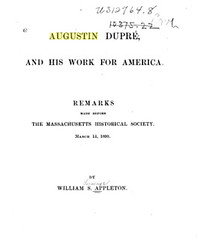
PREV ARTICLE
NEXT ARTICLE
FULL ISSUE
PREV FULL ISSUE
WILLIAM S. APPLETON'S REMARKS ON AUGUSTIN DUPRÉ
Google Books has a copy of William Sumner Appleton's Augustin Dupré and His Work for America: Remarks Made Before the Massachusetts Historical Society, March 13, 1890. Here's an excerpt.
-Editor
Augustin Dupre' was born at St. Etienne near Lyons, October 6, 1748, the son of a shoemaker. St. Etienne was the seat of the royal factory of arms; and as Dupre' entered in youth the employ of a gunmaker, this turned his artistic tastes and faculties in the direction of engraving on metal. At the age of twenty he walked to Paris, where he found the same employment, and soon distinguished himself by his beautiful work on sword-hilts, gradually becoming also an engraver of dies for medals. He lived at Auteuil, not far from Franklin at Passy; and his French biographer says that his acquaintance with Franklin began in their morning walks to Paris, which one can readily accept as probable. The diplomatic philosopher undoubtedly drew from the artist's lips an account of his labors and aspirations, and was easily convinced of his ability as already shown in his works. Duvivier was at that time the principal engraver of the royal mint, and as such was employed to design the medal voted by Congress to Washington for the evacuation of Boston, — a medal of admirable workmanship, but without the least suggestion of imagination or genius. Dupre' undoubtedly felt he could do better, and Franklin gave him the opportunity. I shall speak more particularly of Dupre's American medals later; but his merit had made him Medallist of the Royal Academy of Painting and Sculpture, and an assistant engraver for the mint, when a decree of the National Assembly of April 9, 1791, ordered a competition for designs for a new coinage. Dupre' came out victorious over all other contestants, among whom were Duvivier, the artist of the medals of Washington, De Fleury, William Washington, and Howard, Gatteaux, the artist of the medals of Gates, Wayne, and Stewart, Andrieu and Droz, also medallists of repute. July 11, 1791, Dupre' was named principal engraver of the mint; and so continued till displaced by Bonaparte in 1803. Dupre's beautiful designs of 1791 for the pieces of twenty francs and five francs were again adopted by the short-lived Republic of 1848-1852, and are familiar to all on the coinage of France of the last twenty years, — a remarkable instance of national appreciation and popularity. Dupre' did not receive the cross of the Legion of Honor till 1830. He died at Armentieres, January 31, 1833. His work for America and Americans comprises seven medals,— the Libertas Americana, 1783; the Greene medal, 1787; the Morgan and Jones medals, 1789; the Diplomatic medal, 1792, and two medals of Franklin of 1784 and 1786. The collection now in the Public Library contains something relating to nearly all of these. The Libertas Americana has been the object of unbounded admiration ever since it first appeared. Some extracts from Franklin's letters concerning it may be read in Vol. XI. of the Proceedings of this Society, page 301. The conception of the young American Republic as the infant Hercules, whom France in the armor of Pallas covers with her shield, the legend being " NON SINE DIIS ANIMOSUS INFANS," of course took immensely in France; and the genius of Dupre' wrought out this idea in shape so beautiful that the medal must always rank among the choicest productions in its own department of modern art. In the Dupre' collection are proofs of both sides in gold on a white ground.
So could the Bonham's lot consist of the residue of the collection Appleton bought and donated to the Boston Public Library?
-Editor
To read the complete article, see: Augustin Dupré, and His Work for America

Wayne Homren, Editor The Numismatic Bibliomania Society is a non-profit organization promoting numismatic literature. See our web site at coinbooks.org. To submit items for publication in The E-Sylum, write to the Editor at this address: whomren@gmail.com To subscribe go to: https://my.binhost.com/lists/listinfo/esylum All Rights Reserved. NBS Home Page Contact the NBS webmaster 
|
